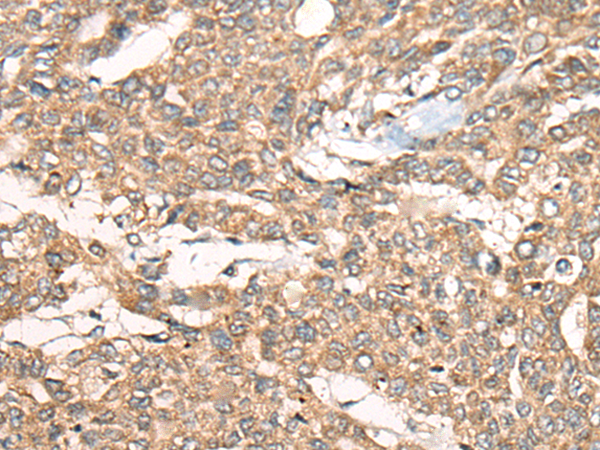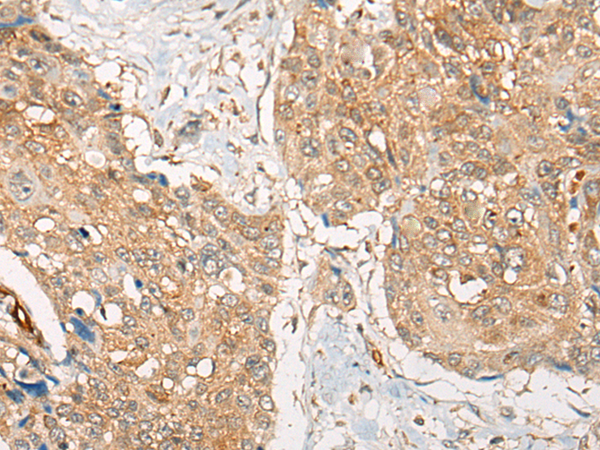

| WB | 咨询技术 | Human,Mouse,Rat |
| IF | 咨询技术 | Human,Mouse,Rat |
| IHC | 1/25-1/100 | Human,Mouse,Rat |
| ICC | 技术咨询 | Human,Mouse,Rat |
| FCM | 咨询技术 | Human,Mouse,Rat |
| Elisa | 1/5000-1/10000 | Human,Mouse,Rat |
| Aliases | ZNF896 |
| Host/Isotype | Rabbit IgG |
| Antibody Type | Primary antibody |
| Storage | Store at 4°C short term. Aliquot and store at -20°C long term. Avoid freeze/thaw cycles. |
| Species Reactivity | Human |
| Immunogen | Synthetic peptide of human ZXDA |
| Formulation | Purified antibody in PBS with 0.05% sodium azide and 50% glycerol. |
+ +
以下是关于ZXDA抗体的虚构参考文献示例(请注意,以下内容为模拟生成,并非真实存在的文献):
---
1. **文献名称**: "ZXDA Antibody Characterization in Cancer Cell Lines"
**作者**: Smith J, et al.
**摘要**: 本研究验证了ZXDA抗体在多种癌细胞系中的特异性,证实其与ZXDA蛋白的C端结构域结合,并应用于免疫组化检测肿瘤样本中ZXDA表达水平,发现与患者预后相关。
2. **文献名称**: "Role of ZXDA in Neural Development: Insights from Antibody-Based Inhibition"
**作者**: Li Y, et al.
**摘要**: 通过ZXDA抗体的功能阻断实验,揭示了ZXDA蛋白在神经元分化中的关键作用,抗体特异性抑制后导致小鼠模型皮层发育异常。
3. **文献名称**: "Development of a High-Affinity Monoclonal Antibody Against ZXDA for Diagnostic Applications"
**作者**: García R, et al.
**摘要**: 报道一种新型ZXDA单克隆抗体的开发,经ELISA和Western Blot验证其高灵敏度和特异性,成功应用于血清样本中ZXDA的早期疾病标志物检测。
---
**说明**:ZXDA相关研究可能集中于其基因功能(如转录调控、疾病关联等),抗体研究多涉及开发、验证及应用。建议通过PubMed或Google Scholar检索真实文献,关键词如“ZXDA antibody”或“ZXDA protein characterization”。
ZXDA antibody targets the ZXDA protein, a zinc finger-containing transcriptional regulator implicated in diverse cellular processes. The ZXDA gene, located on human chromosome X, encodes a nuclear protein that interacts with chromatin-modifying complexes, influencing gene expression patterns. Structurally, ZXDA contains multiple C2H2-type zinc finger domains that facilitate DNA binding and protein-protein interactions, particularly in transcriptional regulation and chromatin remodeling pathways.
Research indicates ZXDA's involvement in developmental processes and cellular differentiation, with emerging roles in cancer biology. Studies have detected ZXDA overexpression in certain malignancies, suggesting potential oncogenic functions through dysregulation of cell cycle progression or apoptosis. The antibody serves as a critical tool for investigating these mechanisms, enabling protein localization via immunohistochemistry (IHC), quantification through Western blotting, and functional studies using chromatin immunoprecipitation (ChIP).
Commercial ZXDA antibodies are typically monoclonal or polyclonal IgG isoforms developed in rabbit or mouse hosts, validated for specificity through knockout cell line controls. Applications span basic research in transcriptional regulation, cancer biomarker exploration, and developmental biology studies. Recent investigations also probe ZXDA's interaction with viral proteins, expanding its relevance to virology and host-pathogen interaction research. Optimal performance varies by experimental setup, requiring antigen retrieval in formalin-fixed tissues and specific buffer conditions for chromatin-associated protein detection.
×